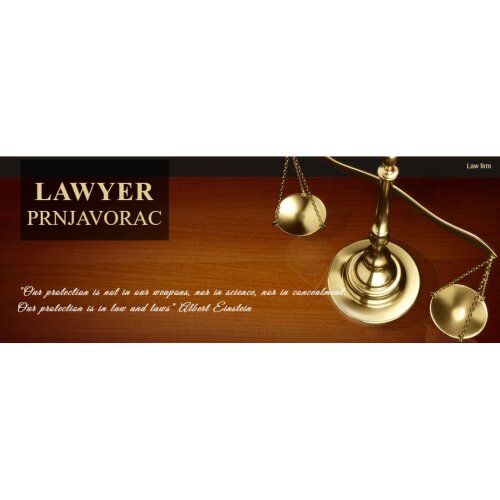Best Landlord & Tenant Lawyers in Bosnia and Herzegovina
Share your needs with us, get contacted by law firms.
Free. Takes 2 min.
Free Guide to Hiring a Real Estate Lawyer
Or refine your search by selecting a city:
List of the best lawyers in Bosnia and Herzegovina
About Landlord & Tenant Law in Bosnia and Herzegovina:
Landlord & Tenant law in Bosnia and Herzegovina governs the rights and obligations of landlords and tenants in rental agreements. It covers issues such as rent payments, maintenance and repairs, eviction procedures, and security deposits.
Why You May Need a Lawyer:
You may need a lawyer for Landlord & Tenant issues if you are facing an eviction, need assistance with a lease agreement, have disputes with your landlord or tenant, or need legal advice on your rights and obligations under the law.
Local Laws Overview:
In Bosnia and Herzegovina, Landlord & Tenant laws are mainly regulated by the Law on Obligations. This law outlines the rights and obligations of landlords and tenants, as well as procedures for rent payments, eviction, and disputes resolution.
Frequently Asked Questions:
1. Can a landlord increase the rent during the lease term?
Generally, landlords cannot increase rent during the lease term unless otherwise stated in the rental agreement.
2. What are the rights of tenants regarding maintenance and repairs?
Tenants have the right to request necessary maintenance and repairs from the landlord. Landlords are usually responsible for maintaining the property in a habitable condition.
3. How can a landlord evict a tenant in Bosnia and Herzegovina?
A landlord can evict a tenant by following the legal procedures outlined in the Law on Obligations. This typically involves sending a formal notice to the tenant and seeking court approval for eviction.
4. Can a tenant withhold rent for lack of repairs?
Tenants are generally not allowed to withhold rent for lack of repairs. However, they may take legal action against the landlord to compel necessary repairs.
5. Are security deposits required in rental agreements?
Security deposits are common in rental agreements in Bosnia and Herzegovina. They are typically used to cover damages or unpaid rent at the end of the tenancy.
6. Can a landlord enter the rental property without permission?
Landlords are usually required to give advance notice before entering the rental property, except in cases of emergencies.
7. How long is the notice period for ending a tenancy?
The notice period for ending a tenancy in Bosnia and Herzegovina is usually 30 days, but it may vary depending on the terms of the rental agreement.
8. Can a tenant sublet the rental property?
Tenants are generally not allowed to sublet the rental property without the landlord's permission.
9. Are there any rent control laws in Bosnia and Herzegovina?
There are no rent control laws in Bosnia and Herzegovina. Landlords are generally free to set rent prices as they see fit.
10. What should I do if I have a dispute with my landlord or tenant?
If you have a dispute with your landlord or tenant, you may consider seeking legal advice from a lawyer specializing in Landlord & Tenant law. They can help you understand your rights and options for resolving the dispute.
Additional Resources:
If you need legal assistance for Landlord & Tenant issues in Bosnia and Herzegovina, you may contact the Ministry of Justice or seek advice from local legal aid organizations.
Next Steps:
If you require legal assistance for Landlord & Tenant matters in Bosnia and Herzegovina, consider contacting a lawyer specializing in this area of law. They can provide guidance and representation to help you navigate through the legal complexities of Landlord & Tenant relationships.
Lawzana helps you find the best lawyers and law firms in Bosnia and Herzegovina through a curated and pre-screened list of qualified legal professionals. Our platform offers rankings and detailed profiles of attorneys and law firms, allowing you to compare based on practice areas, including Landlord & Tenant, experience, and client feedback.
Each profile includes a description of the firm's areas of practice, client reviews, team members and partners, year of establishment, spoken languages, office locations, contact information, social media presence, and any published articles or resources. Most firms on our platform speak English and are experienced in both local and international legal matters.
Get a quote from top-rated law firms in Bosnia and Herzegovina — quickly, securely, and without unnecessary hassle.
Disclaimer:
The information provided on this page is for general informational purposes only and does not constitute legal advice. While we strive to ensure the accuracy and relevance of the content, legal information may change over time, and interpretations of the law can vary. You should always consult with a qualified legal professional for advice specific to your situation.
We disclaim all liability for actions taken or not taken based on the content of this page. If you believe any information is incorrect or outdated, please contact us, and we will review and update it where appropriate.
Browse landlord & tenant law firms by city in Bosnia and Herzegovina
Refine your search by selecting a city.











